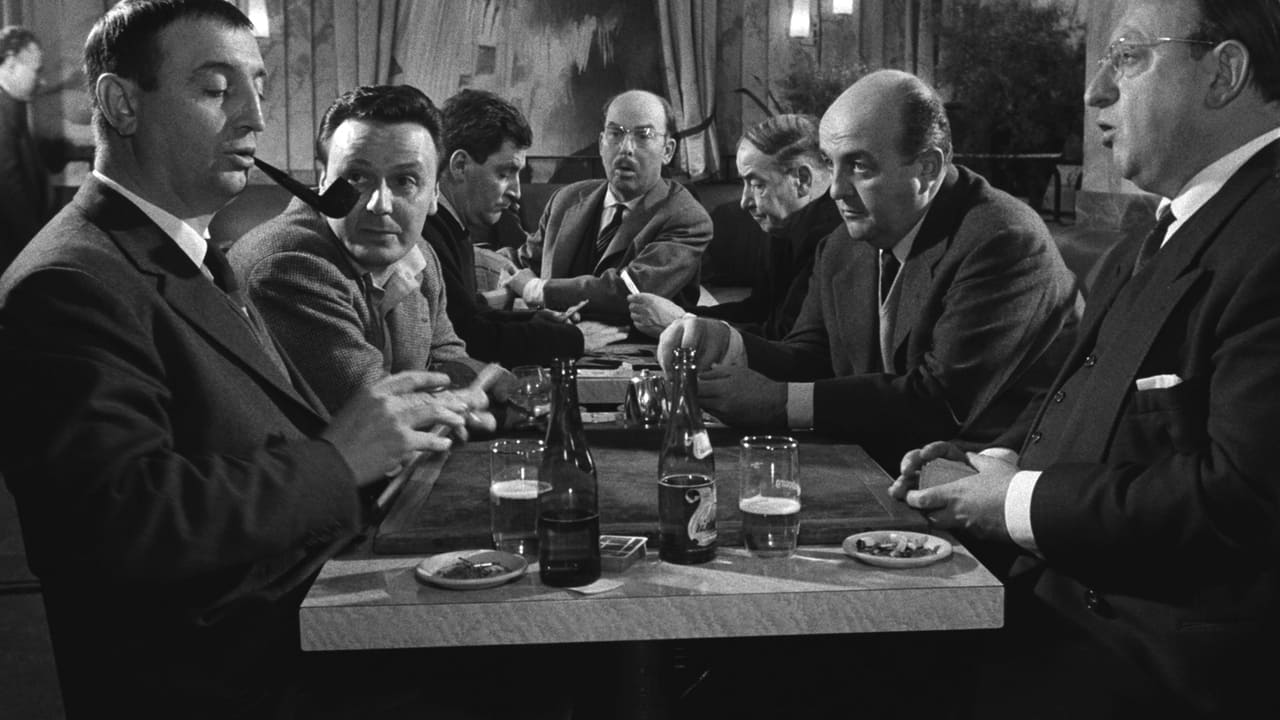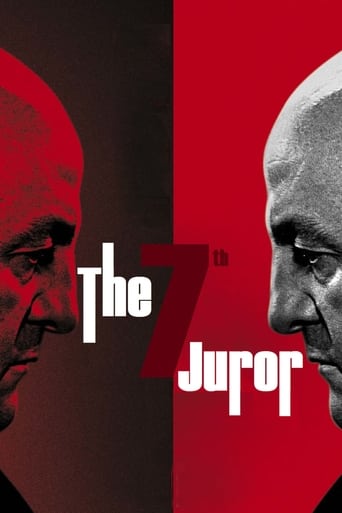Jeanskynebu
the audience applauded
ActuallyGlimmer
The best films of this genre always show a path and provide a takeaway for being a better person.
Sammy-Jo Cervantes
There are moments that feel comical, some horrific, and some downright inspiring but the tonal shifts hardly matter as the end results come to a film that's perfect for this time.
morrison-dylan-fan
Gathering up over 100 French films to watch over the next few months,I started to take a look at French Film Noirs that fellow IMDbers have praised.Whilst reading a review from a IMDBer,I started to wonder about why I had waited to view the title for so long!,which led to me finally going on jury duty. The plot: Less than happy with how his mistress has been treating him, (something we can all identify with!) Grégoire Duval gets into a row with mistress Catherine as she sunbathes.Heating up,Duval strangles Catherine to death.Once the red mist has faded,Duval rushes away from the murder scene,and goes back to his quiet small town. Playing a major part in the town, (which includes standing in local elections) Duval is viewed by the locals as a loyal part of the town,who would never do anything wrong.Thinking that it will be left unsolved,Duval discovers that one of Catherine's other lovers has been arrested for the killing.Caught off guard,Duval is told that he must serve jury duty on the case,which leads to Duval deciding to prove the accused innocent,whilst proving his own guilty verdict. View on the film: Sitting down in court for their adaptation of Francis Didelot's novel,the screenplay by Pierre Laroche & Jacques Robert brilliantly turn the heated courtroom Drama into Film Noir shapes,via layering Duval's brittle narration over proceedings,which allows the writers to deconstruct the courtroom Drama "traditions" and to shoulder Duval with unrelenting Film Noir guilt.Spending time with all of the locals who look up to Duval,the writers strangle Duval with a deliciously dark sense of humour which sinks Duval deep into the Film Noir mist,as Duval finds it impossible to crush anyone's belief that it is impossible for him to commit a crime. Sending ripples across the screen over the gentle credits,director Georges Lautner and cinematographer Maurice Fellous grab Jean Yatove's great jagged score,and smash the peace into Film Noir doom. Stylishly revealing the murderous passion Duval has for Catherine, (played by an alluring Françoise Giret-who appears topless)Lautner buries Duval into Film Noir misery,where a gaze into a glass allows Duval to reflect,whilst the town build a decaying "good" wall of madness around him.Carrying the guilt and closed-minded beliefs of the town like the member of a chain gang, Bernard Blier gives an incredible performance as Duval,thanks to Blier exposing Duval's humble roots in order to drag them into a Film Noir sandpit,where a confession and a final verdict are not able to stop Duval becoming a judge,jury and executioner for his own crimes.
Spikeopath
Le septième juré (The 7th Juror) is directed by Georges Lautner and adapted to screenplay by Pierre Laroche and Jacques Robert from the Francis Didelot novel. It stars Bernard Blier, Maurice Biraud, Francis Blanche, Danièle Delorme and Jacques Riberolles. Music is by Jean Yatove and cinematography by Maurice Fellous. Horrible Crime Near Pontarlier! Overcome by the sight of a nude lady sunbather, Grégoire Duval (Blier) forces himself upon her and in a panic strangles her to death when she begins to scream. Returning back to his hum-drum existence, Duval is shocked to find the victim's boyfriend charged with her murder on circumstantial evidence. He's even more shocked when he is chosen for jury service on that very trial... Crime of a coward - or a madman? A caustic and potent piece of French cinema, Le septième juré operates on many narrative levels. In parts it's a cracker-jack legal drama, featuring a court case of dramatic verve, while the observations about the sometimes folly of the law is brutally laid bare. At other parts it's a cutting deconstruction of small town mentality, of class distinction and standings, all of which are not favourably portrayed in the slightest. First you must save your soul. Firmly operating in the realm of film noir, the makers produce a clinically atmospheric picture. Georges Lautner opens with an ominous shot of a lone fisherman in his boat, out on a mist covered lake, the accompanying classical music amazingly in sync with the scenes. It's evident from this point we are in for some visual and aural treats. Blier provides a classic noir narration as we move among bohemian architecture, through smoky jazz clubs and clientèle exclusive bars. At night the streets are full of shadows, in daylight there's a muted tone to Maurice Fellous' photography, this is not a happy place to live - unless you be one of the secular bourgeois of course... Othello was misunderstood too. Other imagery strikes hard. A confession box sequence is brilliantly filmed, noir nirvana, a tilted mirror used during a key exchange between husband and wife is astute, and the pièce de résistance that involves grotesque reflections on a brandy glass. Haunting scenes drop in and out, normally involving the tortured Duval staring blankly out at someone, while the court case is a hot-bed of hurt and chaos, even turning to the macabre as the crime is reenacted at the actual murder scene. Lautner also likes pull away movements as well, and so do we! Superbly acted, directed, scored and photographed, this is yet another French film that proves that although the first wave of American film noir had faded cum the start of the 60s, the French were keeping the flame alight well into the decade. From that opening misty lake scene, to the black twist finale that is crowned by a stunning ambulance light sequence, this is black gold cinema. Merry Christmas. 9/10
writers_reign
Georges Lautner is possibly best known outside France for a film he made shortly after this one, Les Tontons flingeurs, which enjoyed something of an international mild success. He compensated by making scads of multiplex fodder but with The Seventh Juror he turned in his piece de resistance. Basically it adds a new wrinkle to such entries as The Big Clock, Mr. Arkadin and Police Python 357, that wrinkle being that a murderer finds himself on the jury when the wrong man is brought to trial. Stumbling across a young woman sleeping topless in the open air the middle aged Blier succumbs to temptation and attempts to rape her. When she begins to scream for help he moves his hands to where they will do the most good and chokes her to death. Remaining undetected he stands by as an innocent (in this case) man is charged with the crime and then winds up on the jury where he does everything he can to secure a not guilty verdict. Never exactly sylph-like even in youth Blier in middle age resembles no one so much as Sydney Greenstreet and performs just as well if not better. It is, of course, really the town itself that is on trial - we are clearly in Le Corbeau and Les Inconnus de la maison country here - and there is a brilliant twist at the end. Made in 1962 it it also sticks two fingers up at the new wavelet brigade. Masterful.
dbdumonteil
I wonder why Lautner got lost in mediocrities all along his long and lucrative career.Dozens of junk movies like"la grande sauterelle" "quelques messieurs trop tranquilles" or "flic ou voyou"...why did he bother with such things when he had a brilliant potential that explodes here? "Le septième juré" is a psychological thriller of the first order,that actually belongs to the fifties,when the overrated "new wave" had not happened.Blending Duvivier's pessimism with Clouzot's misanthropy, and beating André Cayatte at his own game (justice and trials),it stands as Lautner's finest achievement. Bernard Blier,excellent as ever,portrays a notable who strangles a semi-whore.Probably because of a sexual frustration.His wife(an excellent Danielle Delorme) is probably a frigid bourgeois woman.The plot thickens when Blier is asked to be a juror when a wrong man is arrested and tried for HIS crime.Then begins a suspenseful and rich story,in which looks tell more than words (the juror and the accused),in which a whole town is involved with its narrow-minded petits bourgeois,its holier-than-thou spinsters,its rotten justice. And that's not all!In the very last minutes,comes a final revelation that will leave you on the edge of your seat.And logical,at that,because it thoroughly explains Blier's behavior.The black and white cinematography is stunning,and the ambulance light in the final shots mesmerizing.


